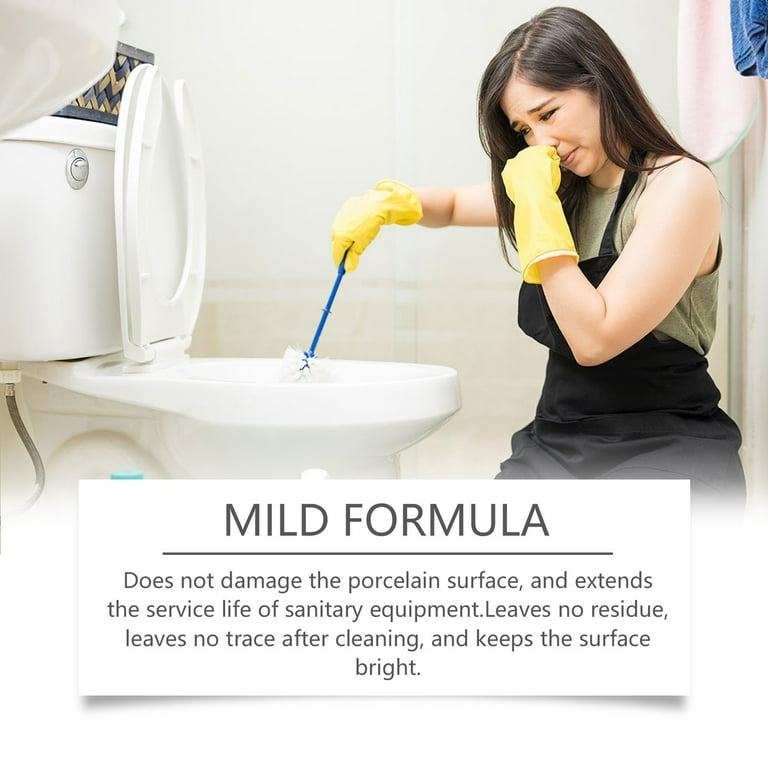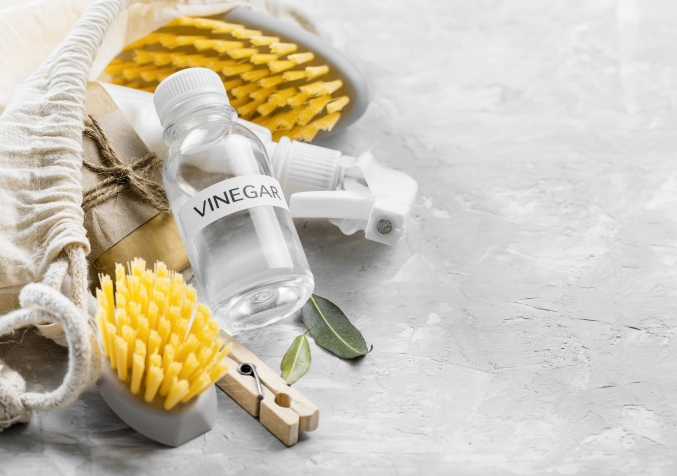Have you ever wondered if your trusty bottle of vinegar could be harming your toilet bowl? You’re not alone.
Many people turn to this common household staple as a natural cleaning solution, but questions linger about its effects. Before you pour vinegar into your toilet, it’s crucial to understand its potential impact. Is it a safe, eco-friendly option, or could it be doing more harm than good?
We’ll uncover the truth about vinegar and toilet bowls. Get ready to discover whether this cleaning hack is a friend or foe to your bathroom. Stay with us as we dive into the surprising facts you need to know!
Vinegar And Toilet Bowl Materials
Vinegar is a versatile cleaning agent, praised for its natural and eco-friendly properties. But have you ever wondered how it interacts with the different materials in your toilet bowl? Understanding this can help prevent any unintended damage and ensure your toilet remains spotless and functional. Let’s dive into how vinegar interacts with various toilet bowl materials.
Porcelain Characteristics
Porcelain is the most common material for toilet bowls due to its durability and stain resistance. Vinegar, being acidic, can effectively clean porcelain surfaces without causing harm. It’s gentle enough to remove hard water stains and mineral deposits without scratching the surface.
However, excessive use might dull the finish over time. You might have noticed a slight change in sheen if you’ve been cleaning your porcelain sink with vinegar for years. It’s a good idea to use vinegar sparingly and rinse thoroughly afterward.
Plastic Toilet Components
Many modern toilets incorporate plastic parts such as seats and covers. Vinegar can be a bit harsh on plastic over time. It might cause discoloration or brittleness if left on too long. Imagine the disappointment of finding your once pristine white toilet seat turning yellow.
To avoid this, always dilute vinegar before use and ensure it doesn’t sit on plastic surfaces for extended periods. A quick rinse is your best friend.
Stainless Steel Fixtures
Stainless steel is often used for screws, hinges, and sometimes flush handles. Vinegar is excellent for cleaning stainless steel, leaving it shiny and spot-free. But here’s the catch: prolonged exposure can lead to corrosion.
Have you ever noticed small rust spots on your kitchen sink after a vinegar cleaning spree? The same can happen to stainless steel toilet fixtures. Use vinegar sparingly and wipe down surfaces promptly to maintain their luster.
Thinking about how vinegar interacts with your toilet materials can save you from unexpected damage. Are you ready to adjust your cleaning habits for a longer-lasting toilet? Remember, the key is moderation and immediate rinsing. Your toilet will thank you!

Credit: www.walmart.com
Common Myths About Vinegar
Vinegar is a popular cleaning agent. Yet, many myths surround its use. People often question if vinegar harms toilet bowls. Let’s explore some common myths. This will help you make an informed choice.
Acidity Concerns
Many worry about vinegar’s acidity. They fear it might erode toilet surfaces. Vinegar is acidic, but not too strong. It cleans without causing damage. Regular use won’t harm your toilet bowl.
Corrosion Myths
Some believe vinegar causes corrosion. They think it ruins plumbing over time. Vinegar is safe for most plumbing materials. It doesn’t corrode pipes or fixtures. Ensure you rinse well after cleaning.
Discoloration Beliefs
Discoloration myths are common. People think vinegar stains toilet bowls. In reality, vinegar helps remove stains. It can brighten your toilet’s appearance. No need to fear discoloration with vinegar.
Scientific Evidence
Have you ever wondered if vinegar, known for its versatility as a cleaning agent, could potentially harm your toilet bowl? Let’s dive into the scientific evidence to understand the impact of vinegar on toilet bowls. We’ll explore its acidic properties, studies on material interaction, and expert opinions. You might be surprised by what science has to say!
Acidic Properties Of Vinegar
Vinegar is primarily composed of acetic acid, which gives it its characteristic tangy taste and powerful cleaning ability. The acidity level of vinegar is typically around 5%, making it effective at cutting through grime and mineral deposits.
This acidic nature is what makes vinegar such a popular choice for cleaning bathrooms. But, how does this acidity interact with toilet bowls? The key lies in understanding the material of your toilet bowl. Is it porcelain, ceramic, or another material?
Studies On Material Interaction
Scientific studies have examined how vinegar interacts with different materials. Porcelain, commonly used in toilet bowls, is generally resistant to mild acids. However, prolonged exposure to vinegar might weaken its glaze over time.
In contrast, studies suggest that ceramic is slightly more vulnerable to acidic reactions. If your toilet bowl is ceramic, you may want to limit vinegar cleaning sessions. Have you checked the material of your toilet bowl recently?
Expert Opinions
Experts in home maintenance often provide nuanced insights. Some suggest that using vinegar sporadically is safe for most toilet bowls. Others recommend diluting vinegar with water to minimize potential damage.
Plumbing professionals often advise caution, especially if your toilet bowl is older or already showing signs of wear. It’s always a good idea to consult a specialist if you notice changes in the appearance or structure of your toilet bowl after using vinegar.
What’s your experience with using vinegar in cleaning? Do you think it’s worth the risk, or are you considering alternatives?
Ultimately, understanding the scientific evidence allows you to make informed decisions about using vinegar in your cleaning routine. Are you ready to test this knowledge in your bathroom?

Credit: www.electrodry.com.au
Vinegar Cleaning Benefits
Vinegar is a versatile cleaning agent with numerous benefits for toilet bowls. It is natural, affordable, and safe for the environment. Many households use vinegar as an alternative to harsh chemical cleaners. Vinegar offers several advantages that make it an appealing choice.
Antibacterial Properties
Vinegar contains acetic acid, which has antibacterial properties. It helps eliminate germs and bacteria lurking in toilet bowls. Regular use keeps your toilet hygienic and reduces the spread of harmful microbes. This natural disinfectant is effective without the need for chemical additives.
Lime Scale Removal
Hard water can cause lime scale buildup in toilets. Vinegar dissolves mineral deposits effectively. Its acidic nature breaks down lime scale without damaging surfaces. Scrubbing with vinegar helps maintain a clean and smooth toilet bowl. Regular treatment prevents stubborn scale formations.
Odor Neutralization
Toilets can develop unpleasant odors over time. Vinegar neutralizes these odors instead of just masking them. Its natural ability to absorb bad smells leaves your bathroom fresh. Pouring vinegar into the bowl eliminates unwanted odors efficiently. This makes vinegar a reliable choice for odor control.
Safe Usage Tips
Using vinegar for toilet cleaning is eco-friendly and affordable. But, improper use might damage the toilet bowl. Understanding safe usage methods can prevent this. Follow these tips to clean effectively without harm.
Dilution Methods
Always dilute vinegar before using it on toilet bowls. Mix one part vinegar with one part water. This reduces its acidity. It also minimizes the risk of damage. Pour the diluted solution gently around the bowl. Let it sit for 20 minutes. Then scrub with a toilet brush.
Frequency Of Use
Limit vinegar cleaning to once a week. Overuse can cause gradual wear. Regular usage helps prevent stubborn stains. But don’t overdo it. A weekly routine keeps your toilet fresh without harm.
Alternative Cleaning Solutions
Baking soda is a great alternative. It’s gentle yet effective. Sprinkle it in the bowl. Add diluted vinegar for a fizzy clean. Lemon juice also works well. Its natural acids clean and leave a fresh scent. Consider these options for safe toilet maintenance.

Credit: www.youtube.com
Frequently Asked Questions
Can Vinegar Harm The Toilet Bowl Surface?
Vinegar is generally safe for toilet bowls. It cleans and disinfects without causing damage to most surfaces.
How Often Should I Use Vinegar In The Toilet?
Using vinegar once a month can help maintain cleanliness. It prevents mineral buildup and keeps the toilet fresh.
Is Vinegar Effective Against Toilet Stains?
Yes, vinegar can remove stains. It breaks down mineral deposits and grime effectively, leaving your toilet cleaner.
Does Vinegar Work For Hard Water Deposits?
Vinegar is effective for hard water deposits. Its acidic nature dissolves mineral buildup, helping to restore cleanliness.
Can Vinegar Remove Toilet Odors?
Vinegar neutralizes odors. Its natural disinfectant properties reduce bacteria, helping to eliminate unpleasant smells in toilets.
Conclusion
Vinegar offers a natural cleaning solution for toilet bowls. It’s effective in removing stains and odors. Regular use helps maintain cleanliness. But, moderation is key. Overuse can lead to potential damage. Especially in older toilets. Avoid mixing with bleach or harsh chemicals.
They can create harmful fumes. Always rinse well after use. This ensures safety and longevity. Vinegar is budget-friendly and eco-friendly. It’s a great alternative to chemical cleaners. Just use wisely and enjoy a sparkling clean toilet bowl.
